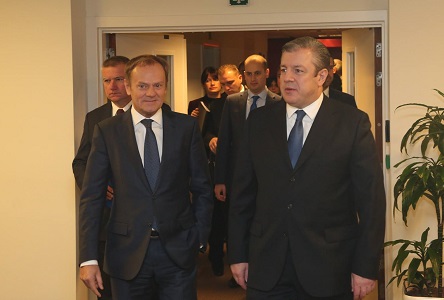Donald Tusk: “Georgia deserves timely, positive decision on visa liberalisation”

President of the Council of Europe (CoE) Donald Tusk is wholeheartedly supporting Georgia as it moves through the final stages of visa liberalisation with the European Union (EU) and believes the country should soon be offered a visa waiver.
This afternoon Tusk met Georgia's Prime Minister Giorgi Kvirikashvili in Brussels, Belgium and told the Georgian leader that visa liberalisation was on the horizon for Georgia.
He said "Georgia deserves a timely and positive finalisation of its visa liberalisation” as the country has met all its obligations.
We are now working hard on the EU's response. And I want to underline that only on the EU side because this is now only our internal problem; to make sure that the required visa suspension mechanism, which is a horizontal mechanism for all of the EU's visa arrangements, will be agreed as soon as possible,” said Tusk.
The CoE high official praised Georgia's "ambitious reform agenda" within its Association Agreement and Deep and Comprehensive Free Trade Area (AA/DCFTA), which would offer huge benefits to Georgia,, its people and EU-Georgia bilateral relations.
The EU will continue to assist you in this process,” Tusk said.
Meeting PM @KvirikashviliGi today. Strong EU-Georgia relations. EU remains firm in its support: https://t.co/8MZRSSzWjtpic.twitter.com/bxlDBkgI0r
— Donald Tusk (@eucopresident) December 1, 2016
I look forward to setting further common objectives for this cooperation at our next Eastern Partnership Summit in November next year,” he added.
When speaking about Georgia’s October Parliamentary Elections, Tusk noted the the race was a "true success” for Georgia's democracy.
He thanked Kvirikashvili for Georgia's "continued contributions” to EU crisis management operations including "assisting us in advancing EU foreign and security policy objectives”.
About regional security issues, Tusk expressed concern about the recent ratification of a so-called agreement between Russia and Georgia’s breakaway Abkhazia region on military cooperation.
For the EU it is clear that this agreement violates international law including the principle of the inviolability of Georgia's sovereignty, territorial integrity and internationally recognised borders. It has no legal status for the EU,” Tusk stressed.
Always glad to meet @eucopresident@donaldtusk - a good #EUleader & a friend of #Georgia. Thank you for your support! https://t.co/nThFHuZatN
— Giorgi Kvirikashvili (@KvirikashviliGi) December 1, 2016
Meanwhile a short time ago Georgia’s PM evaluated the meeting with Tusk as "very important” and stressed Georgia was eager to continue implementing a range of reforms to improve democracy and bring the country in line with high, EU standards.
We’re looking forward to a renewed version of the EU-Georgia Association agenda that will be a guideline for us in the course of the next for years.
Georgia's PM stressed the recently released report of the EU confirmed Georgia’s "significant progress” to assimilate into the Euro-Atlantic space in areas of political association and economic integration with the EU.
He added granting visa liberalisation to Georgia would make European benefits more "tangible” for Georgian citizens, and the country deserved it and had met all its obligations to qualify for a visa waiver to the EU's Schengen Zone.
Kvirikashvili stressed Georgia was ready to actively cooperate with the EU in all directions, including foreign policy and security.
Before the meeting ended he thanked the EU for its "firm support” of Georgia’s sovereignty and territorial integrity and he praised the role of the European Union Monitoring Mission (EUMM) as a supporter of peace and security, as it was the only international mission that currently operated at the de facto border with Georgia’s occupied regions.
Georgia's high official said the role of the EUMM was especially important when historic parts of Georgia were occupied by Russia, who also continued its creeping occupation of Georgian soil, violating all international standards and fundamental human rights.
 Tweet
Tweet  Share
Share